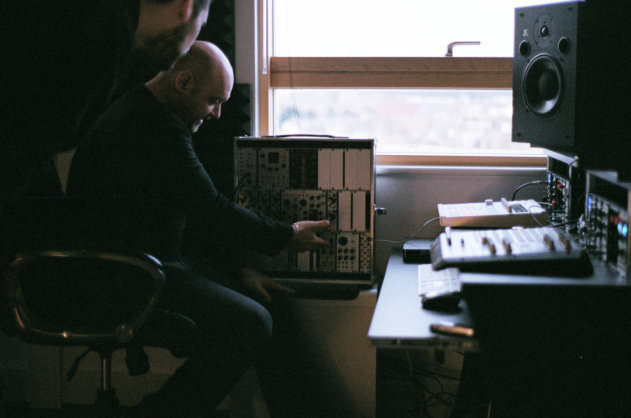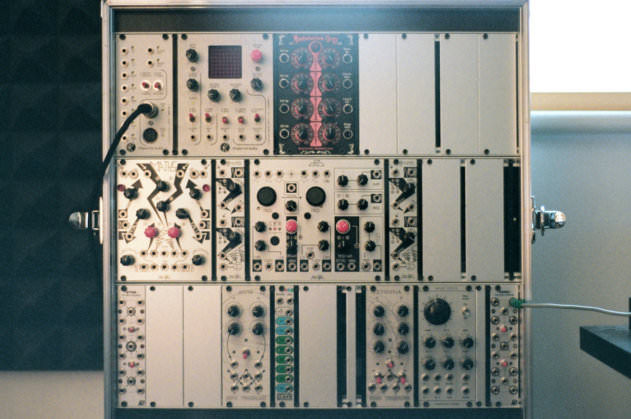
The common thread here whether it’s Detroit or Plaid or yourself is just jumping in and getting on with it, whether you know exactly what you’re doing it or not. You weren’t worrying so much about how other people were making music or trying to copy their techniques.
Well, I guess the learning process was about copying people’s sounds. Those first six months that I spent were about trying to recreate the sounds that I really liked. Trying to get the same bass sounds as those guys, trying to get the same drum sounds. I think most artists do that. That’ the way you learn, I guess, by imitating. As you gradually become confident I think every artist should put their own signature on it and that’s when you become different and personal and original. That definitely happened with me. I tried to recreate the whole Detroit sound and then with my early releases I tried to put in that soul and funk background that I had. Otherwise you’re just copying people and it’s pointless. If you’re a genuine artist I think you automatically know that. At first you’re pleased that you’re sounding like someone else, then you become pleased that you don’t sound like anyone else.
That idea of progression and moving forward fits in with Machine and your policy of not playing music more than a year old. How relevant do you think that idea still is to techno?
Until techno becomes known as a retro music like funk or something then I think it’s always about trying to do something new and looking forward. Looking forward and being futuristic are such vague terms that I’m not sure if people really know what they mean any more, but techno to me has almost become a music like jazz. It might not be the heyday of jazz any more but jazz has influenced so many musical genres and it still exists in its pure form as well. I think techno’s like that – it’s like a kind of loose framework that you can associate with but you can take it off in so many different directions, like dub techno or pure Detroit techno, industrial techno or what I call wrist-slitting techno, the kind of gothic techno that’s quite popular at the moment.
If you’re a genuine artist I think at first you’re pleased that you’re sounding like someone else, then you become pleased that you don’t sound like anyone else.
Wrist-slitting is definitely having a moment.
Yeah, those very dark industrial distorted drums with very digital sawtooth synth rises and big reverbs. It’s more coming from the whole industrial punk sound rather than anything I associate with, but everything has its place. I’m sure the whole deep house thing will influence the techno that’s coming out of Detroit too. Well, it already is with artists like Theo Parrish and those guys.
How does the new label fit in with what you’re doing with the club night?
Machine as a label will be a showcase for the DJs who play at the night. I think it’s important to have a musical representation of something that’s happening in clubland. There were two concerns that Ben Sims and I had. A lot of the techno clubs were becoming a bit like an old Las Vegas circuit, where you had older DJs just playing classics and the crowd wouldn’t be taking much notice because they’d just be waiting for them to play ‘Strings Of Life’ or something like that. So we wanted to put the focus back on the music and the way to do that was to play all new music. Not unreleased, just music no older than a year.
The other concern was that because record sales don’t bring in a lot of income any more, we noticed a trend for a lot of producers to go out on the road and never make any music. So we were also very particular about having a label to release music from the DJs who appear at the club, so we could challenge both of those patterns which we didn’t think were particularly positive for the scene in general.
Once we did a few parties we realised that something was happening that we didn’t really account for. Hearing new music all night definitely takes clubbers out of a comfort zone that they were in and we noticed that the atmosphere was a bit… wilder. A bit messier, shall we say. We thought it wouldn’t be such an ecstatic thing because the music would be unfamiliar. We thought we’d get a lot of very serious music people but in fact people were just going absolutely nuts.
When you feel quite comfortable in a club and you’re on a dancefloor listening to ‘Good Life’ for the fifty-millionth time, you’re in a happy cosy state and everything’s quite safe. We realised that’s become the conservative side of clubland, whereas when you’re in a club and everything’s unfamiliar you get the nerves going again and you’re on edge. It was like a psychological study of clubbers. People were losing it. It was really intense.
Hearing new music all night definitely takes clubbers out of a comfort zone that they were in. We noticed that the atmosphere was a bit wilder.
Even at big festivals, where people want to hear classics. Ben was like, ‘I don’t think this is going to work.’ I said, ‘You can do what you want, I’m just going to carry on.’ And it’s worked. It’s amazing. I think Ben does a few cheeky re-edits to slip in older tracks.
He’s found a loophole!
Haha. Yeah! But all the other DJs who we’ve had as guests, we thought we might have a few saying, ‘You can’t tell me what to play. Who do you think you are?’ All of them have been brilliant. They really want to play a lot of new music but they’ve never felt that promoters wanted them to. Surgeon actually said that he goes on Discogs to check that his records aren’t over a year old. Guys like Rolando have so much new music that they want to play. They just love it. Luke Slater’s another one. He releases so much on Mote-Evolver and Planetary Assault Systems that he loves playing Machine because he can test out all that new stuff.


07.22 PM
His aunt outgrew “clubbing” at the age of seventeen?
08.38 PM
Great interview.
10.47 AM
Great inteview as always, keep ’em coming.
09.09 AM
That ma man Atjazz